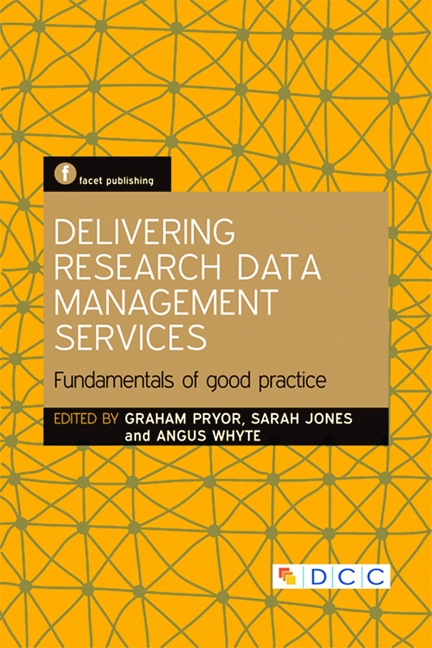Book contents
- Frontmatter
- Contents
- Preface
- Contributors
- 1 A patchwork of change
- 2 Options and approaches to RDM service provision
- 3 Who's doing data? A spectrum of roles, responsibilities and competences
- 4 A pathway to sustainable research data services: from scoping to sustainability
- 5 The range and components of RDM infrastructure and services
- 6 Case study 1: Johns Hopkins University Data Management Services
- 7 Case study 2: University of Southampton – a partnership approach to research data management
- 8 Case study 3: Monash University, a strategic approach
- 9 Case study 4: a national solution – the UK Data Service
- 10 Case study 5: development of institutional RDM services by projects in the Jisc Managing Research Data programmes
- Index
4 - A pathway to sustainable research data services: from scoping to sustainability
Published online by Cambridge University Press: 08 June 2018
- Frontmatter
- Contents
- Preface
- Contributors
- 1 A patchwork of change
- 2 Options and approaches to RDM service provision
- 3 Who's doing data? A spectrum of roles, responsibilities and competences
- 4 A pathway to sustainable research data services: from scoping to sustainability
- 5 The range and components of RDM infrastructure and services
- 6 Case study 1: Johns Hopkins University Data Management Services
- 7 Case study 2: University of Southampton – a partnership approach to research data management
- 8 Case study 3: Monash University, a strategic approach
- 9 Case study 4: a national solution – the UK Data Service
- 10 Case study 5: development of institutional RDM services by projects in the Jisc Managing Research Data programmes
- Index
Summary
Introduction
This chapter describes the phases involved in developing and establishing research data management (RDM) services. It draws on the Digital Curation Centre's programme of engagement with universities in the UK, and from working alongside related projects developing RDM services. The chapter envisages a development cycle that involves a range of the stakeholders and actors discussed in Chapter 3.
The RDM development cycle is viewed here as a recurring sequence of six phases, familiar from other forms of service design. The first involves envisioning the need for change, then initiating a process to bring that change about. Next is a discovery phase, characterizing the data management lifecycle and its stakeholders to scope their requirements for change. This enables the design of policies and services to address gaps between what is currently done and what is needed. Alpha and beta stages of the design phase test the ground for the implementation phase. Lastly, evaluation of the process and its outputs should ensure that what has been learned feeds into the continuous improvement of services provided to researchers and other customers, such as funding bodies, research users and the broader public.
In section 2 we describe the six phases identified in Figure 4.1: envision, initiate, discover, design, implement and evaluate. These are informed by service design principles and established practice in business process reengineering (BPR) (Kettinger et al., 1997).
Developing a research data management service in a university is like business process reengineering in some respects. For example, senior management need to support it, customer requirements need to be met, and internal stakeholders’ buyin is essential. RDM is also like BPR in that its outputs typically include tools for transforming digital data and the workflows around data production. Also like BPR, cultural change may be at least as significant to success as the enhanced capabilities that are on offer from changed systems.
There are also important differences between the RDM context and business process change. Section 3 considers the research data management context, including the norms of practice with which service development must contend. Research contexts are unlike business processes in that they are typically more complex – i.e., the activities involved are difficult, uncertain, and with highly variable levels of interdependence and standardization.
- Type
- Chapter
- Information
- Delivering Research Data Management ServicesFundamentals of Good Practice, pp. 59 - 88Publisher: FacetPrint publication year: 2013
- 6
- Cited by



